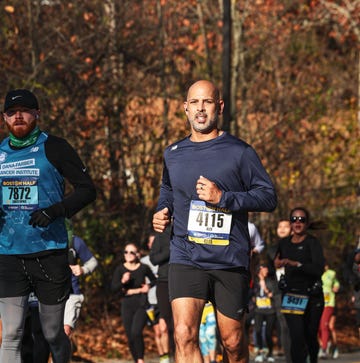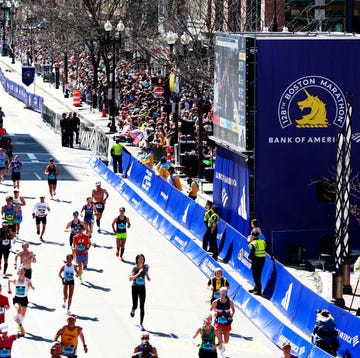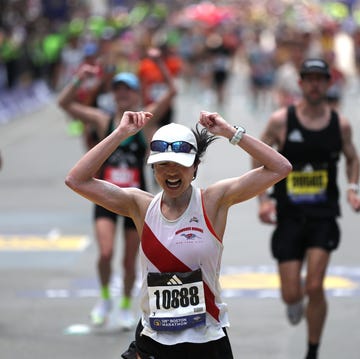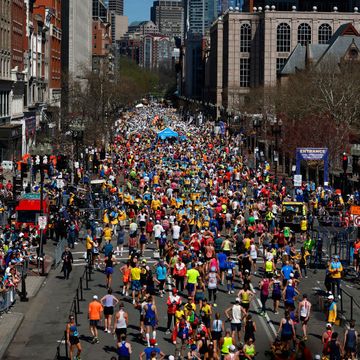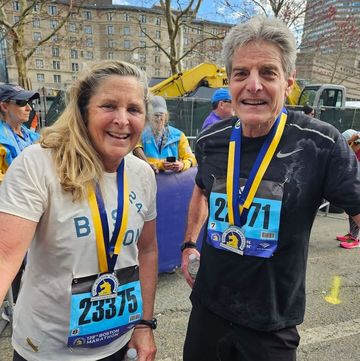Lisa Miele, 45, of Lincroft, New Jersey, will run her second Boston Marathon on Monday to Robert James Reese, an organization that helps children with cancer. While almost everyone she has encountered has been positive about her decision to run for charity in Boston, one former coworker took issue with it.
“I got a message through Facebook Messenger and she let me have it,” Miele told Runner’s World by phone. “She told me that I was misrepresenting myself as a qualified runner and I had no right to say that, that I hadn’t qualified for anything, I was running for a charity.”
Miele said she was always very clear in her communication with others that she was a charity runner, and she was taken aback by the venomous message.
“She actually made a comment that she hoped I never made it up Heartbreak Hill,” Miele said.
Such vitriol is rare, runners say. But as it gets more difficult each year to gain a spot in the Boston field as a qualifier, some runners who can’t get into the race harbor resentment toward charity runners.
Interest in the race has grown so much that it’s no longer enough to run a marathon in a qualifying time for your age and gender. Now the field fills on a rolling basis, and the fastest runners get in first. In order to earn a bib for the 2016 Boston Marathon based on qualifying time, runners needed to be faster than their qualifying times by at least 2:28. This left 4,562 runners who met their qualifying times on the sidelines.
Boston’s charity program offers another route into the race, however. The race allows roughly 6,000 runners who have not qualified. The majority of them run to raise money for charities, with fundraising minimums of $5,000 and higher. (Some get into the race via invitational entries reserved for sponsors, running clubs, towns along the route, and others.)
“For many runners, qualifying and participating in the Boston Marathon is the highlight of their running careers,” a Boston Athletic Association spokesperson wrote in an email to Runner’s World. “While it is extraordinarily difficult to inform those who have qualified that there is not enough space for everyone, we also recognize that this is an eagerly-anticipated event for many charitable organizations and nonprofits in our community.”
The BAA also points out that most funds “directly benefit the community.” Boston charity runners raised a collective $28.3 million in 2015.
Even that huge sum, however, isn’t enough to offset the pangs some qualified runners feel in September when registration opens, and they find themselves shut out.
Adam Frager, 43, of Newport News, Virginia, ran 3:13:07 at the 2015 Newport News One City Marathon, 1:53 under his Boston Marathon qualifying time, but 35 seconds too slow to get into the 2016 race. Frager understands the value of having charity runners in the Boston Marathon, but he believes runners who have met their qualifying times should take precedence at registration time.
“I think they should be allowed, but I think the 6,000 charity [and invitational] runners is excessive,” Frager told Runner’s World by phone. “I think there’s some place for charity, but not at the expense of qualifiers.”
New Hampshire’s Keith Somers, 42, who ran the Boston Marathon four times as a qualified runner, agrees.
“I think that the people that actually work for their qualifying times deserve preferential treatment,” he told Runner’s World by phone.
Frager and Somers said they have no problems with having charity runners in the Boston Marathon, but they would want to earn their spots in the race by running qualifying times.
Related: How to Start Running
“I’m competitive. I’ve always been a competitive athlete. [Qualifying for Boston] was something that I wanted to earn and not buy my way into,” Somers said. Frager and Somers said that they don’t blame charity runners for taking spots that are set aside for them in advance of registration.
Susan Hurley, owner and founder of Charity Teams, an organization that helps charity runners train and fundraise for the Boston Marathon and other races, says that over the years, she’s seen improved attitudes regarding the inclusion of charity runners in the Boston Marathon.
“People are beginning to realize that charity runners are not going away,” Hurley told Runner’s World by phone. “They are [becoming] part of the fabric of every race. As much as there has been, I think, in the past a few people who voiced [negative opinions about charity runners in Boston] on social media, I think it’s been softened and I think it’s a good thing.”
Somers said that when he found out he didn’t make the cut for this year’s race, he made a negative comment on the Boston Marathon’s Facebook page and “got quite the lashing.”
Boston Marathon Qualifying Standards Get Tougher.
Hurley has seen some changes in the makeup of the charity running population in Boston in recent years. She’s had an increasing number of applicants who met their qualifying times but were shut out of the race. And she's seeing more runners who already have their own bibs, either through qualifying or an invitational entry, but they voluntarily run for charity.
For the most part, if qualified runners are looking down on those who get into Boston without qualifying for the race, they tend to keep it to themselves.
Jeff Maher, 49, of Overland Park, Kansas, ran his first Boston Marathon in 2011 as a charity runner. He says that though he’s overheard conversations in which people have expressed frustration that non-qualified runners are taking spots that should go to those who meet the qualifying times, he’s always been treated well in Boston, whether he’s qualified for the race or not.
Though Maher initially got into Boston through a charity bib in 2011, he then qualified for the race and voluntarily ran three more years for April Marathons for Runners Shut Out of Boston.
“I still look back at my first Boston and I’m so much more proud of the fact that I was able to go out and raise $20,000 for a charity, have a great race, and really enjoy it,” Maher said. “That, to me, was even more meaningful than earning my way in.”
Hurley hopes that the line between charity runners and qualified runners in Boston eventually blurs more.
“My goal would be to one day have something on the Boston Marathon [registration page] that says, ‘As a registered runner, you can also run for charity, which charity would you like to run for?’ I would love to see that,” Hurley said.



